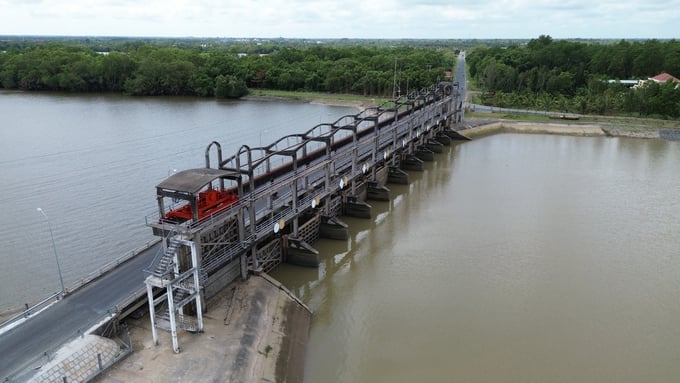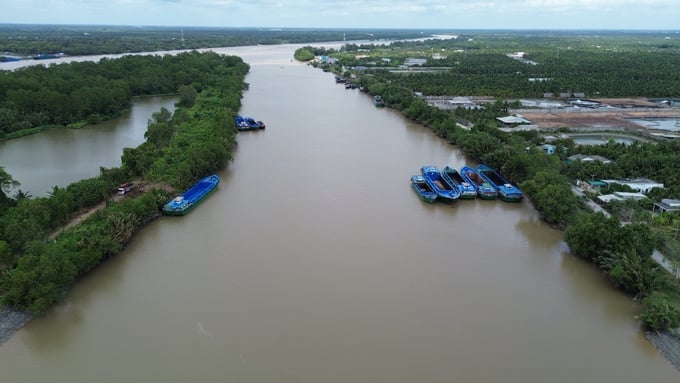June 5, 2025 | 05:09 GMT +7
June 5, 2025 | 05:09 GMT +7
Hotline: 0913.378.918
June 5, 2025 | 05:09 GMT +7
Hotline: 0913.378.918
According to the Department of Water Resources, Ministry of Agriculture and Rural Development, studies have shown that over the past 30 years, sea levels have risen by about 20 cm, with high tides increasing more than low tides, leading to increased tidal energy. The region has 17 river mouths with a total width of about 25 km, resulting in increased seawater intrusion ranging from 25% to 65%, causing an increase in tidal inundation and saltwater intrusion.
Additionally, water drainage is also challenging, leading to an increase in flood areas due to rainfall, tides, and prolonged flooding periods. According to national climate change scenarios, sea levels along the coast of the Mekong Delta will rise by 30 cm by 2050 and 75 cm by 2100. This increase will deeply impact the delta due to land subsidence and high tidal amplitudes.

The Ba Lai drainage and dam system is one of the nine components of the North Ben Tre freshwater conversion project. Photo: Kim Anh.
Additionally, due to the impact of climate change, extreme and abnormal weather events such as large storms and super typhoons are occurring more frequently, potentially causing unpredictable losses. Mangrove forests play a crucial role in protecting people, stabilizing the coastline, and preventing erosion, but their area has decreased by up to 80% over the past 50 years.
According to data from the Mekong River Commission, by 2024, countries have built 128 reservoirs (13 on the mainstream, 115 on tributaries) with a useful capacity of about 88 billion m3, expected to increase to 90 - 95 billion m3 by 2030 and reach 120 billion m3 upon completion of 231 reservoirs (31 on the mainstream, 200 on tributaries). The full-season flow will increase, but unfavourable changes in patterns causing extreme impacts may lead to a decrease at the beginning of the season, resulting in the earlier saltwater intrusion.
Statistics from 1995 to 2017 show that the area under rice cultivation in the Mekong Delta has increased from 3.19 million ha to 4.19 million ha, aquaculture from 0.29 million ha to 0.8 million ha, and fruit trees from 0.18 million ha to 0.33 million ha, leading to an increased demand for irrigation water.
The increasing demand for water puts pressure on irrigation infrastructure. When irrigation systems fail to meet these demands, excessive groundwater extraction occurs, leading to the lowering of groundwater levels and land subsidence.
Land subsidence is a major cause of increased flooding (from rainfall and tides) and saltwater intrusion. Saltwater intrusion in the Mekong Delta during the dry season, characteristic of the region, occurs frequently and adaptive measures have been implemented to meet production and livelihood needs in the past.

Currently, the Ministry of Agriculture and Rural Development is implementing a review of the master plan for water resources in the Mekong Delta, expected to be submitted for Prime Ministerial approval in 2024. Photo: Kim Anh.
Ensuring access to clean water for all rural residents in the context of climate change is a significant challenge, especially during the dry season when freshwater sources are limited and saltwater intrusion is deep and prolonged. Compounding these challenges are limited resources, deteriorating water supply infrastructure, limited capacity for water supply, and dispersed populations.
Mr Nguyen Hong Khanh, Deputy Director of the Water Resources Management Department, stated that to address the urgent needs related to flooding, inundation, and challenges posed by climate change, the Prime Minister and the Ministry of Agriculture and Rural Development have approved several planning projects. Currently, the review and implementation of the master plan for water resources in the Mekong Delta are underway, with plans to submit it for Prime Ministerial approval in 2024. Additionally, previous water infrastructure projects were primarily designed for rice irrigation. However, current demands necessitate a multifunctional approach to water usage (rice, aquaculture, fruit trees, domestic water), which requires adjustments to ensure optimal effectiveness.
During the 4-year salinity cycle, the coastal areas in the Mekong Delta have encountered various difficulties due to drought and salinity in the dry season of 2023-2024.
Dr. Le Anh Tuan, Senior Advisor of the Climate Change Research Institute at Can Tho University, assessed the development of drought and saline intrusion in the Mekong Delta during the dry season of 2023-2024. This period is comparable to two previous instances of saline intrusion in 2015-2016 and 2019-2020.
Translated by Hoang Duy

(VAN) VAAS and numerous Vietnamese enterprises have signed cooperation agreements with Japanese partners to promote agricultural technology and trade connectivity.
/2025/05/29/5625-12-214801_567.jpg)
(VAN) Provincial mergers in the Mekong Delta promise to streamline administration, expand inter-provincial raw material areas, and foster close linkages in agricultural value chains, benefiting both businesses and cooperatives.

(VAN) Merging Mekong Delta provinces contributes to the expansion of agricultural raw material areas, addressing previous constraints caused by provincial boundaries. Additionally, this expansion will reduce costs and strengthen linkages between businesses, cooperatives, and farmers.
/2025/05/29/1043-2-153730_145.jpg)
(VAN) The Government's policy to merge provincial-level administrative units opens up major opportunities for the Mekong Delta region to reshape its agricultural development strategy toward large-scale production, effective regional linkages, and sustainability.

(VAN) The mutual export of agrifood products between the European Union (EU) and the United Kingdom (UK) must occur again without certification, border controls or other red tape. This was agreed at the UK-EU summit.
/2025/05/22/5121-2-173645_677.jpg)
(VAN) NBSAP Tracker identifies strengths and areas for improvement in the National Biodiversity Strategy, based on each region’s priorities and capacities.

(VAN) The draft amendment to the Circular on rice export trading stipulates a periodic reporting regime for rice exporting enterprises.